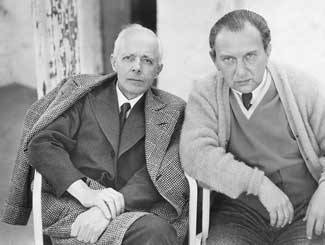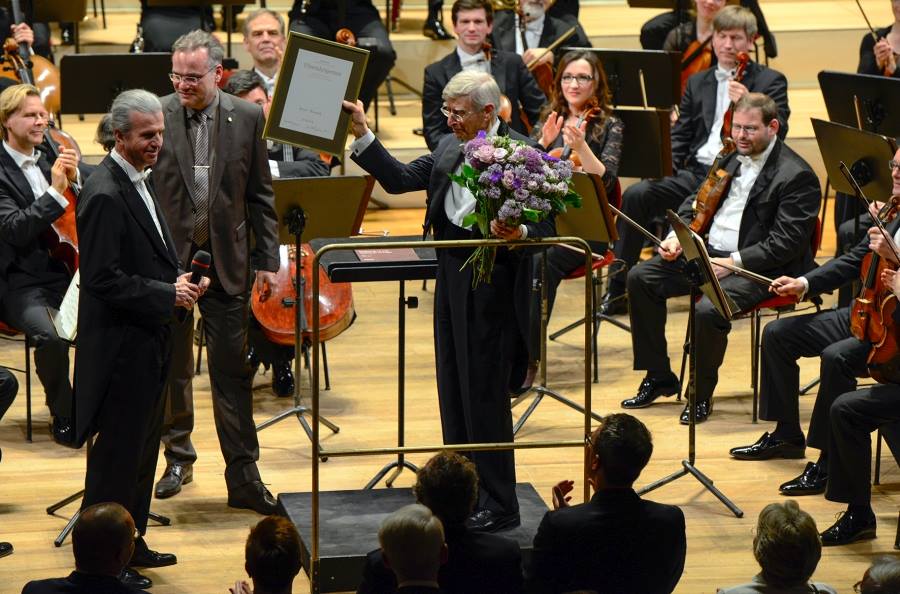Herbert Blomstedt: Fritz Reiner would fire you for nothing
mainThe veteran conductor tells an audience that he follows Fritz Reiner in giving extremely small gestures to let the orchestra find its own musicality.
But, says Blomstedt, Reiner (r.) tolerated neither humour nor dissent.

Listen here.
Blomstedt is an incredible raconteur.






When 27, Reiner hit on his thumb when he tried to hang-up a picture of Beethoven on the wall and has been moody ever since.
His stories of Reiner firing 2 musicians at will on the spot is … well, one can imagine the devastating effect on the two persons.
George Szell, another Hungarian, used to do the same thing in Cleveland.
I have been fired & now at 71 still living & surviving well. Being fired IS NOT the end of the world.
Somehow, I suspect those stories have accumulated details over the years to become more entertaining .
I’ve read more than one version of the “small beat” tale. The first time it, was a bass player who had set up an actual telescope.
And the “Don Juan” story is not plausible at all.
Did you read that in Aronold Jacobs Song and Wind? Reiner was an absolute tyrant, but legendary musicians who played under him had tremendous respect for him and would constantly speak about his impeccable standards. They accepted the harshness because that is simply how things were back then. Now everyone is like a snowflake.
You can be demanding as long you treat people with respect. Use psychology. No need to be some military officer in basic training yelling at his recruits.
Then there’s the story of violinist M. Schnee, fired by Reiner from the Pittsburgh Symphony, the Met Orchestra and the Chicago Symphony before spending the rest of his career in the NYC Ballet Orchestra and freelancing in other NYC venues. Schnee played well but, somehow, Reiner didn’t like his looks.
That’s funny. Reiner didn’t like his looks. And Fritz Reiner was such a handsome fellow. Grandpa Munster was more handsome than Reiner.
My composition teacher in undergrad school was, during the Reiner era, organist of the Chicago Symphony. At that time, the organ console was above the orchestra, stage right, in back of the second violin section. The organist had his back to the conductor, and relied on a a mirror to see him. Reiner’s gestures were so tiny that he couldn’t see them in the mirror, and during the break he asked the Maestro if he could possibly use a bigger beat. Predictably, he was met with an angry refusal.
The next rehearsal, Reiner looked up to cue the organ and saw him looking into the mirror with a pair of binoculars. He was fired on the spot.
I recall reading of a CSO musician pulling out a spyglass and asking out loud “where’s the beat” and being fired on the spot. Like most bullies, when faced with a real threat Reiner backed down. At roughly the same time that Toscanini was attacked by a mob, and briefly held under house arrest, for refusing to perform La Giovinezza before a concert, Reiner was similarly told to perform it before an opera performance and acceded to the demand.
The actual spyglass story dates back to Reiner’s time with Pittsburgh. The bassist with the spyglass was Greenberg. This was related to me by a Curtis grad violinist whose first job was there. He later came to NY, becoming a busy TV staff violinist and recording contractor.
Steve,
Was the composition teacher Mr. Winkle?
Hi Steve! Interesting story. Solti, the next Hungarian, was more genial–though his beat probably as inscrutable as Reiner’s. See you soon!
Blomstedt’s conducting hero is Furtwangler
Among others. His teacher was Igor Markevitch, and he is also inspired by conductors like Bruno Walter, Tor Mann, Heinz Bongartz and Leonard Bernstein.
Reiner would have made a great lead for the movie “Grumpy Old Men.”
This story is probably apocryphal but it is still fun to tell.
The Chicago Symphony musicians and Fritz Reiner were rehearsing Beethoven’s 7th and nothing seemed to work. predictably, it was not long until Reiner lost his temper and demanded to know who told the musicians to phase the way they do.
The trembling concertmaster explained that they have the scores marked from the last time they played the work when conductor was Josef Krips. To which Reiner replied: ‘Vat is dis? ze creeps? You give me ze creeps!!!’
To him this was funny.
It is funny….rather. At least funny by Reiner’s standards.
I assure you from first-hand witnesses that most of the scary stories about Reiner are not apocryphal. A prominent former principal of the CSO told me that he would not want to go through those years again.
Like Toscanini, he could quite charming with those who didn’t work for him.
But as Harvey Sachs’ new biography of Toscanini documents with numerous examples, he hated to fire musicians and almost never did it. And never capriciously.
You can read two very interesting books: Philip Hart (Fritz Reiner, a biography) and Kenneth Morgan (Fritz Reiner, Maestro and Martinet) , with a lot of anecdotes about this fantastic conductor.
The photograph with Bela Bartok is a “selfie” taken by Fritz Reiner with a self retardator camera
Reiner was of course Leonard Bernstein’s conducting teacher at Curtis.
I can’t even imagine how the lessons must have gone every week.
Along those lines Leonard Bernstein and George szell immensely respected each other to the point that Lenny reportedly wept upon hearing of the death of szell. Can one imagine more polar opposites with respect to podium style?
and yet Szell comes across quite warmly in that masterclass footage of him with Levine etc. An impression confirmed by Karajan, who described Szell as a very charming host at parties held at his house.
Psychopaths such as Reiner and Szell could be very charming when it served their needs, which were not in all cases in service of music. These anecdotes are funny but I think the musicians who worked under them endured hell.
You shouldn’t use the word “psychopath” with out checking the actual meaning of the word. Few if any of the characteristics apply to these conductors.
Ignorant and inaccurate. Difficult, demanding and perhaps occasionally abusive verbally, certainly by today’s standards, but completely committed to interpreting the work of composers who they revered. To get a glimpse of at least one musicians view of GS I would suggest reading the chapter in Anshel Brusilow’s autobiography Shoot The Conductor about his tenure in Cleveland. His account is thoughtful and goes beyond the usual trite adjectives.
At least part of the reason for LB’s reaction to GS’s passing might be that he had just finished a concert with the CO at Blossom as a sub for GS. Given the comments about LB’s informality with FR I also recall reading that LB somewhat resented strangers referring to him as Lenny when they wouldn’t dare call GS George. Last, I would recommend that people compare their Schumann cycles (LB with the NYPO); clearly different but both imo quite superb.
The only grade of “A+“ in conducting Reiner ever awarded was to Bernstein. But when Bernstein, while still a student, dared addressing Reiner by his first name, Reiner gave him a murderous look and adressed him as Mr. Bernstein. Lenny got the hint …
Later, thier relationship had apparently soured, and one one occasion Reiner saw Bernstein at a restaurant, came to his table and said loudly, “You are a shit !”
I think the backstory is that the relationship between Reiner and Bernstein came to an acrimonious (or at least icy) end when Lenny started studying with/working with Serge Koussevitzky at Tanglewood.
Perhaps he was publicity shy but there is no opportunity to hear what Reiner’s voice sounded like via either interview or rehearsal .
Hilary,
Actually, there is. In the “Fritz Reiner – Complete Chicago Symphony Orchestra Recordings”, there’s a brief interview on one of the discs where he discusses Beethoven’s 7th Symphony.
Reiner can be heard speaking in that film: http://www.imdb.com/title/tt0039244/?ref_=nv_sr_1
The interesting thing is that Reiner did not come to the U.S. as a refugee from the Nazis. He moved here (well, I’m writing from the U.S.) in the 1920s and made it his home base very quickly.
Struck me as a bit odd, given the status he’d achieved at a young age in Dresden. And the U.S. years weren’t always smooth sailing. He was music director of the Cincinnati Symphony – pretty good job even then but not one of the prestige American orchestras at the time. And the Pittsburgh Symphony was hardly a plum job when he got it – an orchestra formed by musicians who were out of work due to the Great Depression. Even the Chicago Symphony wasn’t great shakes in 1953 when he arrived – a good, solid history with a long period of stability under Frederick Stock, but it had had a revolving door on music directors after Stock died in 1942 and was considered a provincial ensemble.
What I’m saying is Reiner didn’t get anything handed to him. He took over diamonds in the rough and did remarkable polishing jobs.
His sarcasm was a way of testing for weak links and well, driving them out. When he went up against a first class musician who stood his ground – like the CSO’s longtime first oboe, Ray Still – and wouldn’t let Reiner push him around, Reiner would back down. But if he could rattle somebody who had weak confidence…..yes, fresh meat to a tiger.
Ok, he was tough. But disliking some humor [remember some laughing when Rostropovich was rehearsing with the Puerto Rican’ Casals Festival in the 1970s] was too much. If I had been a musician I would had told him ‘not only you are good conductor but also an asshole’. Too bad.